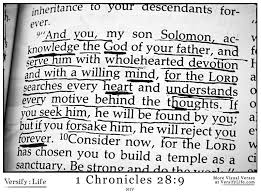 Chronicles seeks to retell the story of the God of history, more specifically the biography of the God of Israel’s history – especially Davidic kingship. Much like the books of Samuel and Kings, the division present in the books of Chronicles is arbitrary, resulting from the length of the work. The books of first and second Chronicles seek to legitimize the priestly authority and analyze the kingships of Solomon and David, focusing on their significant, positive, theological influence.
Chronicles seeks to retell the story of the God of history, more specifically the biography of the God of Israel’s history – especially Davidic kingship. Much like the books of Samuel and Kings, the division present in the books of Chronicles is arbitrary, resulting from the length of the work. The books of first and second Chronicles seek to legitimize the priestly authority and analyze the kingships of Solomon and David, focusing on their significant, positive, theological influence.
First Chronicles begins with a lengthy genealogy. In ancient times, it was important to note who was related. As the Israelites reclaim their homeland from the Babylonia exile, the tribal names and structure begin to reappear. Thus, it is important to note what land belonged to which tribe, as well as to legitimize who was a Levitical priest. These Levitical priests were charged to give oversight to worship, sacrifice, and festivals. As the Israelites reenter their homeland, the Chronicler offers a theology of hope. The present distress would one day give way to the restoration of Israel, according to the theocratic ideal expressed in Chronicles.
 Chapters 10-29 of first Chronicles begin to reveal the theological agenda of the Chronicler. The central message of the work centers on the Israelite united monarchy and the crucial roles play by David and Solomon in establishing and maintaining the temple of Yahweh in Jerusalem. The reader must be careful to note that the Chronicler expressed freedom in what was included and excluded from his writings. This includes material from both biblical and extrabibilical sources. One must consider, however, the intended audience. The author is writing to an audience that has come back from Babylonian exile. This group desires to inhabit the promise land and establish a covenant life with Yahweh. One great example of omission by the Chronicler is the overemphasis of favorable character traits of David and Solomon.
Chapters 10-29 of first Chronicles begin to reveal the theological agenda of the Chronicler. The central message of the work centers on the Israelite united monarchy and the crucial roles play by David and Solomon in establishing and maintaining the temple of Yahweh in Jerusalem. The reader must be careful to note that the Chronicler expressed freedom in what was included and excluded from his writings. This includes material from both biblical and extrabibilical sources. One must consider, however, the intended audience. The author is writing to an audience that has come back from Babylonian exile. This group desires to inhabit the promise land and establish a covenant life with Yahweh. One great example of omission by the Chronicler is the overemphasis of favorable character traits of David and Solomon.
The kingship of Saul is expressed in one chapter of first Chronicles. His life is evaluated in chapter 10 verse 13, “Saul died because he was unfaithful to the Lord; he did not keep the word of the Lord and even consulted a medium for guidance, and did not inquire of the Lord.” On the contrary, the Chronicler spends ample time discussing the kingship of David. In chapter 17, the author recounts the Davidic Covenant and David’s prayerful response. In Chapter 20 verse 1, the author omits David’s sin with Bathsheba. Scholars have argued the rationale for this. First, the audience would have been familiar with the story of David, and understood that he had sinned. In addition, the audience can read Psalm 51 for reference to David’s sin. The Chronicler focused his work on religious reforms with the understanding that his audience was already familiar with these characters and stories. Respect for divinely appointed authority figures and obedience to the covenant stipulations were absolutely essential for the success of the postexilic community.
 A modern reader of 1 Chronicles should realize the authors’ intended audience. One of the Chronicler’s main purposes was to portray the history of Israel in a positive way, as to instill hope in the readers. The audience would have understood the kingships to which the author was referring to, and realized that the author omitted part of the story. Likewise, the scripture offers the modern reader hope. The book of 1 Chronicles focuses on the kingship of David, focusing on the positive aspects of his reign. The focus on the Davidic Covenant also offers a modern reader hope. The Davidic Covenant sets the foundation for messianic theology. Today, Christians understand that allusion to be Jesus Christ. Similar to the audience of 1 Chronicles, modern readers have the hope that Christ will return.
A modern reader of 1 Chronicles should realize the authors’ intended audience. One of the Chronicler’s main purposes was to portray the history of Israel in a positive way, as to instill hope in the readers. The audience would have understood the kingships to which the author was referring to, and realized that the author omitted part of the story. Likewise, the scripture offers the modern reader hope. The book of 1 Chronicles focuses on the kingship of David, focusing on the positive aspects of his reign. The focus on the Davidic Covenant also offers a modern reader hope. The Davidic Covenant sets the foundation for messianic theology. Today, Christians understand that allusion to be Jesus Christ. Similar to the audience of 1 Chronicles, modern readers have the hope that Christ will return.